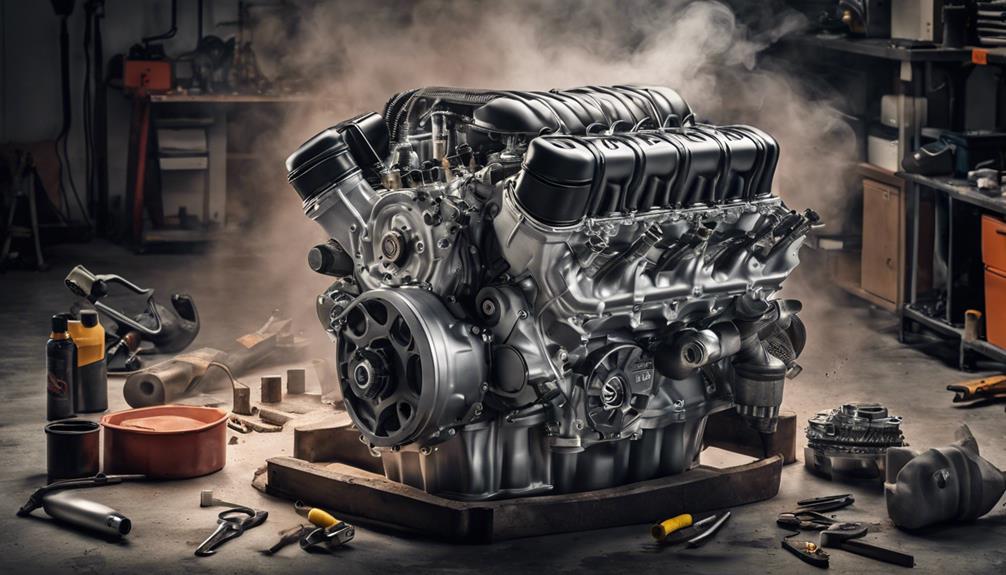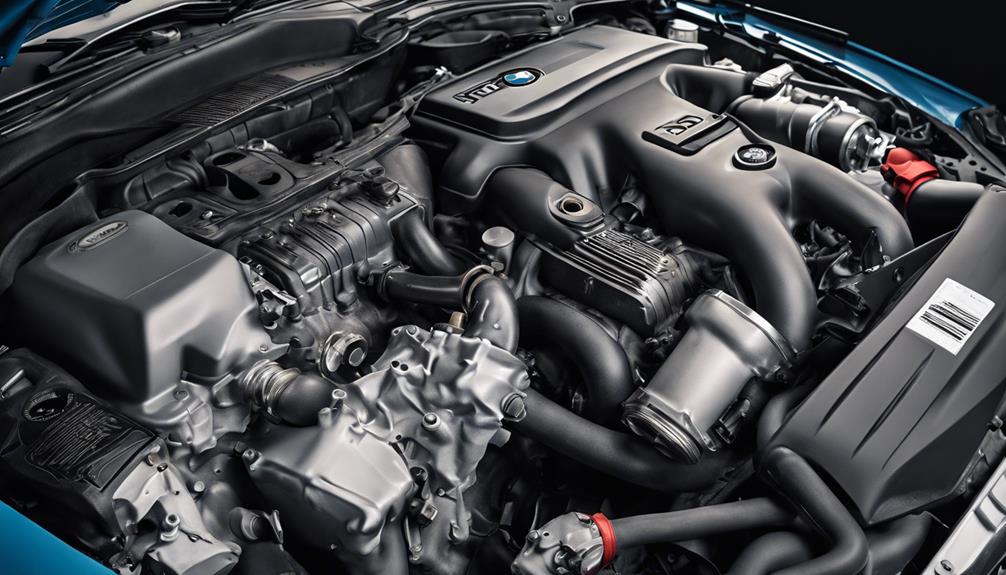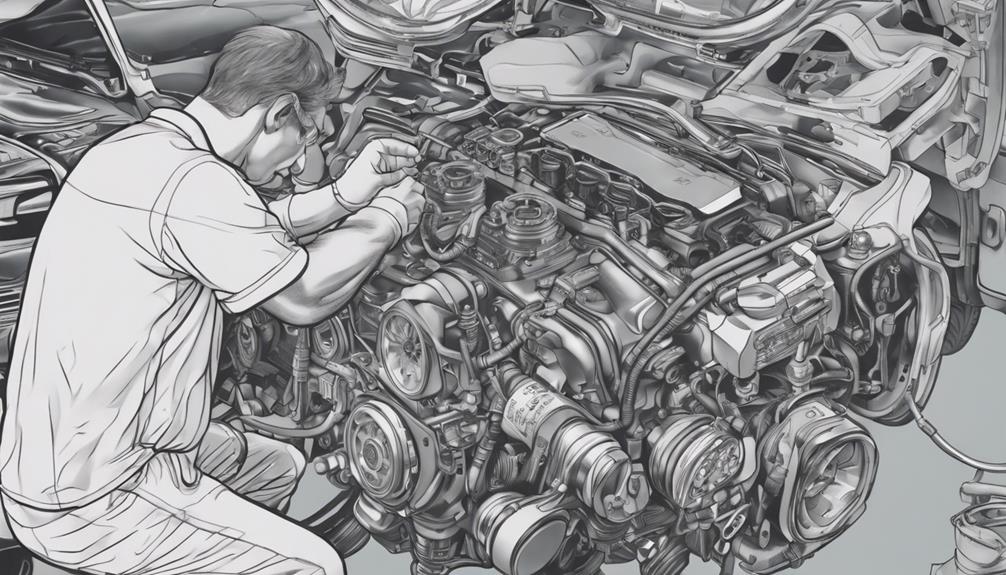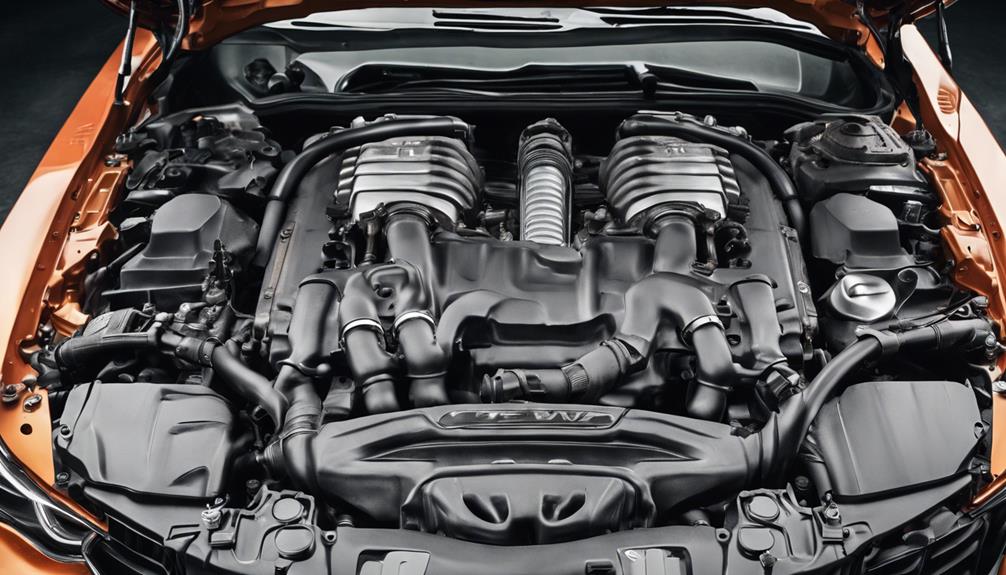Owning a BMW F01 means maneuvering through a potential minefield of issues like oil leaks, coolant system disruptions, timing chain failures, and power steering pump malfunctions. From jerky gear shifts and transmission fluid leaks to mechatronics and drivetrain problems, be prepared for an array of challenges that could test your driving experience. Each corner holds a new puzzle to solve, ensuring that your journey in the world of BMW F01 keeps you on your toes.
Key Takeaways
- Valve cover gasket oil leaks
- Coolant leaks from cracked expansion tank
- Timing chain guide failures
- Electric water pump issues
- Radiator coolant leaks and thermostat failures
Engine Issues
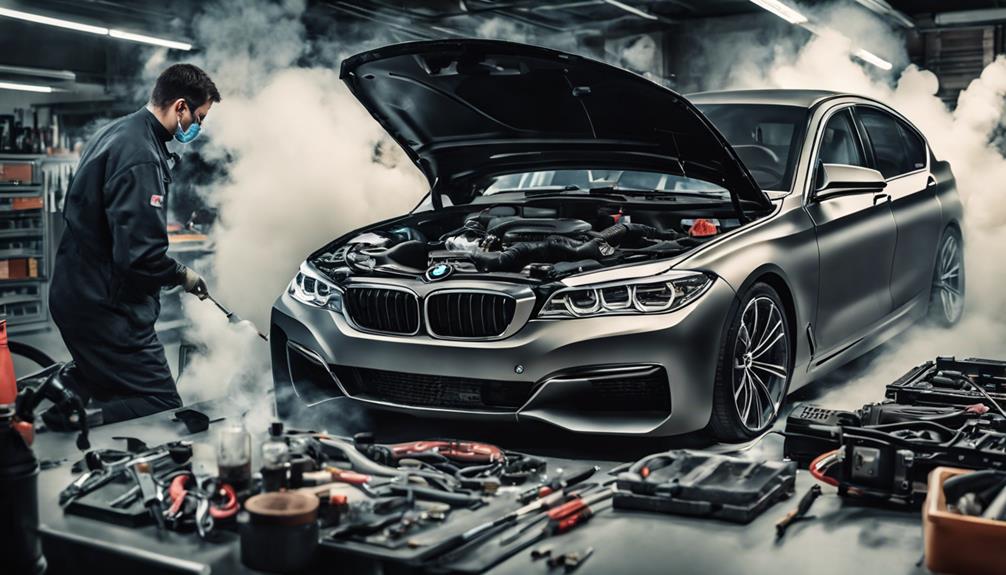
If you own a BMW F01, be prepared to navigate through a maze of potential engine issues that may challenge your driving experience.
The BMW F01 is known to experience oil leaks from the valve cover gasket, leading to messy situations and potential engine troubles.
Imagine having to deal with coolant leaks from a cracked expansion tank, disrupting the cooling system's efficiency.
Timing chain guide failures might catch you off guard, demanding immediate attention to prevent severe engine damage.
Electric water pump failures are also on the list of reported issues, impacting the engine's cooling performance and requiring swift action to rectify.
Additionally, radiator coolant leaks, thermostat failures, and water pump issues can all interfere with the engine's temperature regulation, creating a cocktail of concerns for BMW F01 owners.
It's essential to stay vigilant and address these engine vulnerabilities promptly to guarantee your driving experience remains smooth and hassle-free.
Diesel Engine Vulnerabilities
If you're cruising in a BMW F01 diesel, brace yourself for potential fuel injection system and turbocharger hiccups down the road. The n57 turbo diesel engine, a staple in models like the 730d, might throw a timing chain tantrum after hitting the 200-250,000km mark.
To keep your diesel powerplant purring, stay vigilant on maintenance at the 150-250,000km range to dodge avoidable breakdowns.
Fuel Injection System
After surpassing 100,000 kilometers, BMW F01 diesel engines are prone to fuel injector failures caused by clogging or wear. When these essential components get obstructed or worn out, you might notice rough idling, misfires, power loss, or increased fuel consumption.
To avoid these headaches, regular maintenance is key – cleaning and inspecting the injectors can save you from pricey repairs down the road. However, if the injectors do need replacing, brace yourself; it's a complicated and costly endeavor, often demanding specialized tools and expertise.
Swiftly addressing any fuel injection system woes in your BMW F01 is critical for top engine performance, fuel efficiency, and overall dependability. Stay vigilant, and keep those injectors in top shape!
Turbocharger Issues
Diesel engines in the BMW F01 series, particularly the N52 and N57 models, may encounter troublesome turbocharger issues as they accumulate mileage. The N57 turbo diesel, found in models like the 730d, can start showing signs of turbocharger problems after reaching the 150-250,000km mark. These diesel engines are prone to turbocharger failures, leading to diminished engine performance, increased exhaust emissions, and potential damage.
To keep your BMW F01 running smoothly, regular maintenance and thorough inspections are vital to catch turbocharger issues early on. Addressing these problems promptly can prevent further harm to the diesel engine and ensure peak performance in your BMW F01. Stay ahead of the game by keeping an eye on your turbocharger's health.
Timing Chain Replacement
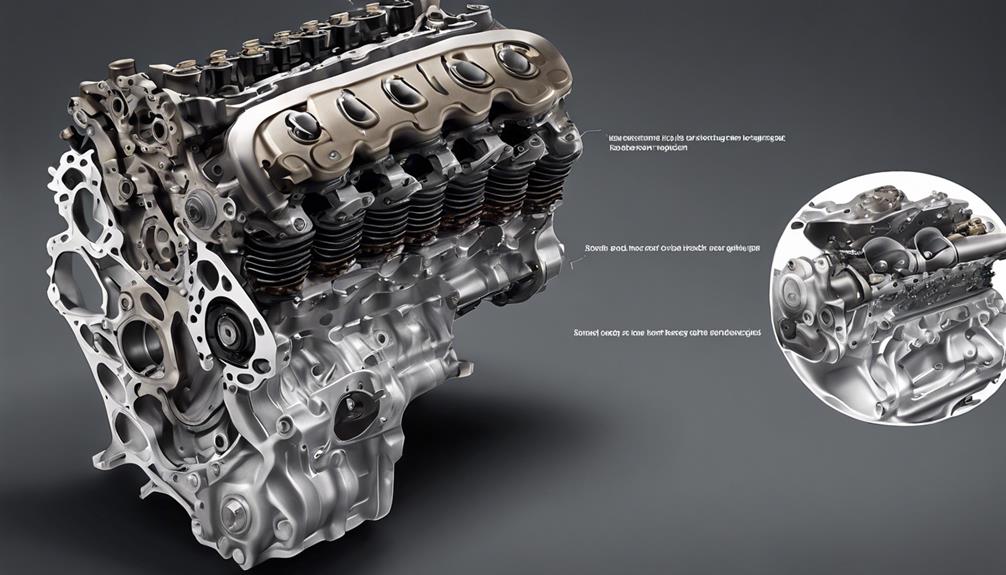
To guarantee peak engine performance and avoid expensive repairs, timely replacement of the timing chain in BMW F01 models is essential after reaching 200,000 to 250,000 kilometers. Neglecting this maintenance can result in chain stretch, leading to severe engine damage. Signs of a failing timing chain include engine misfires, rough idling, rattling noises, and the check engine light coming on. Using premium replacement timing chain kits and entrusting the replacement to skilled technicians familiar with BMW engines is advisable. Regular upkeep and adhering to the recommended replacement intervals can greatly enhance the longevity and efficiency of your BMW F01 engine.
| Timing Chain Replacement Tips | |||
|---|---|---|---|
| 1. Mileage for Replacement | 200,000 – 250,000 km | ||
| 2. Signs of a Failing Chain | Misfires, rough idling | Engine rattling noises | Check engine light on |
| 3. Importance of Maintenance | Prevents engine damage | Ensures peak performance | Saves on costly repairs |
Transmission Problems
Experiencing jerky gear shifts and encountering sticking transmission issues are common challenges that BMW F01 owners may face with their vehicles. These problems can be frustrating, disrupting the smooth driving experience you expect from your luxury car.
Transmission fluid leaks are another headache for F01 owners, emphasizing the importance of regular maintenance to prevent more significant issues down the road.
The mechatronic sleeve adapter failures are like the gremlins of the transmission world, causing malfunctions that can throw a wrench in your driving plans. Manual transmission models aren't exempt either, with potential clutch problems affecting how smoothly you can shift gears.
The delayed engagement when shifting gears is the transmission's way of saying, 'I'll get to it when I feel like it,' creating a lag that can be both annoying and concerning. Stay vigilant and address these transmission woes promptly to keep your BMW F01 cruising along smoothly.
Drivetrain Concerns
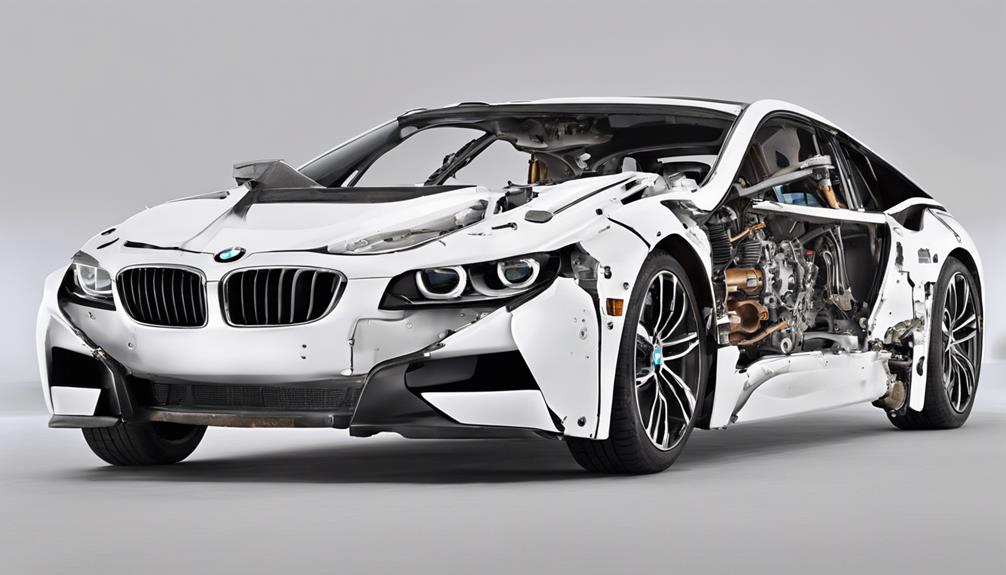
If you've been noticing some shifting woes in your BMW F01, mechatronics failures in the automatic transmission could be to blame after hitting the 100-150,000km mark.
The all-wheel drive system might throw a curveball with flexible coupling wear around the same mileage, so keep an eye out for any drivetrain hiccup.
Don't forget about the front axle CV joint issues that can crop up post-100,000km, especially in all-wheel drive setups—maintenance matters for that smooth ride.
Transmission Issues
Amidst the luxury and performance prowess of BMW F01 models, transmission issues can stealthily lurk, causing jerky gear shifts and sticking gears. These problems can be quite the annoyance, disrupting the smooth driving experience you expect from your BMW.
From transmission fluid leaks to mechatronic sleeve adapter failures, the drivetrain can throw some curveballs your way. If you're driving a manual F01, watch out for clutch problems that can mess with your gear engagement. And don't be surprised by delayed gear shifts – it's a known headache in these cars.
Keep an eye out for mechatronic failures in automatic transmissions, especially after hitting the 100-150,000km mark. Stay sharp, and don't let these transmission gremlins catch you off guard!
Differential Problems
Differential problems in the BMW F01 can manifest as abnormal noises or vibrations originating from the drivetrain. These issues can lead to difficulty turning, especially at low speeds or when parking. Keep an eye out for fluid leaks from the differential as they can be an indicator of a potential problem that needs immediate attention. If you notice uneven tire wear or a sensation of the vehicle pulling to one side, it could be a sign of differential issues in your BMW F01. Neglecting differential maintenance may result in costly repairs or drivability issues down the road.
| Signs of Differential Problems in BMW F01 |
|---|
| Abnormal noises or vibrations from drivetrain |
| Difficulty turning, especially at low speeds |
| Fluid leaks from the differential |
| Uneven tire wear |
| Vehicle pulling to one side |
Steering and Suspension Issues
When driving a BMW F01, be prepared for potential steering and suspension issues that may arise, requiring timely attention to maintain peak performance and safety.
Front suspension arms on the BMW F01 may need replacement between 60,000 to 100,000 kilometers, while front springs can break after 150,000 to 200,000 kilometers of driving.
Keep an eye out for power steering pump failures, especially in models with active steering and diesel engines. If you start hearing extraneous knocks in the steering system, don't ignore them as they may signify underlying problems.
It's worth noting that the BMW F01 7 Series offers active integral steering for enhanced maneuverability and handling.
Stay on top of regular maintenance and inspections to catch these issues early and keep your BMW F01 running smoothly on the road.
Body Component Problems
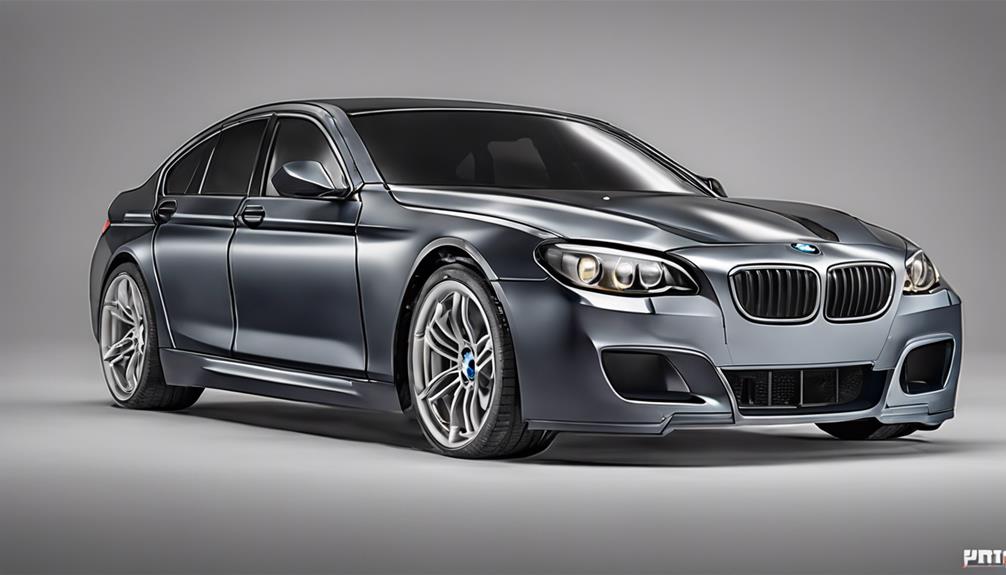
Body component problems in BMW F01 models can present challenges, particularly when facing issues with the front doors in specific weather conditions. When dealing with these challenges, you might encounter:
- Front doors freezing shut in cold weather, causing difficulties in accessing the vehicle.
- Malfunctions in the locking mechanisms, leading to potential security concerns.
- External door handles failing to operate correctly, requiring immediate attention to guarantee seamless functionality.
While the body of the BMW F01 is generally resistant to corrosion, problems with the front doors can still arise, especially in adverse weather. Addressing these issues promptly is essential to maintain the overall integrity of your vehicle. So, if you find yourself struggling with frozen doors or malfunctioning handles, don't hesitate to take action and keep your BMW F01 in top condition.
Electrical Component Concerns
Concerned about the electrical components in your BMW F01? Staying informed about potential issues is crucial to keep your car running smoothly. Electrical component worries in BMW F01 models can vary from minor inconveniences to more significant problems. Here's a breakdown of some common electrical issues you might encounter:
| Electrical Concerns | Description | Solution |
|---|---|---|
| Terminal Disconnect | Common remedy for electrical failures in BMW F01 models. | Professional inspection may be necessary. |
| Generator Wear | Replacement may be needed after 150-200,000km due to wear. | Seek advice from a mechanic for replacement. |
| Door Handle & Light Unit | External door handles and frm light control unit may present issues. | Inspect wiring and connections for faults. |
Taking proactive measures to address these electrical concerns can prevent larger problems in the future. Keep an eye out for any signs of malfunction and address them promptly to ensure your BMW F01 remains in top condition.
Common Failures
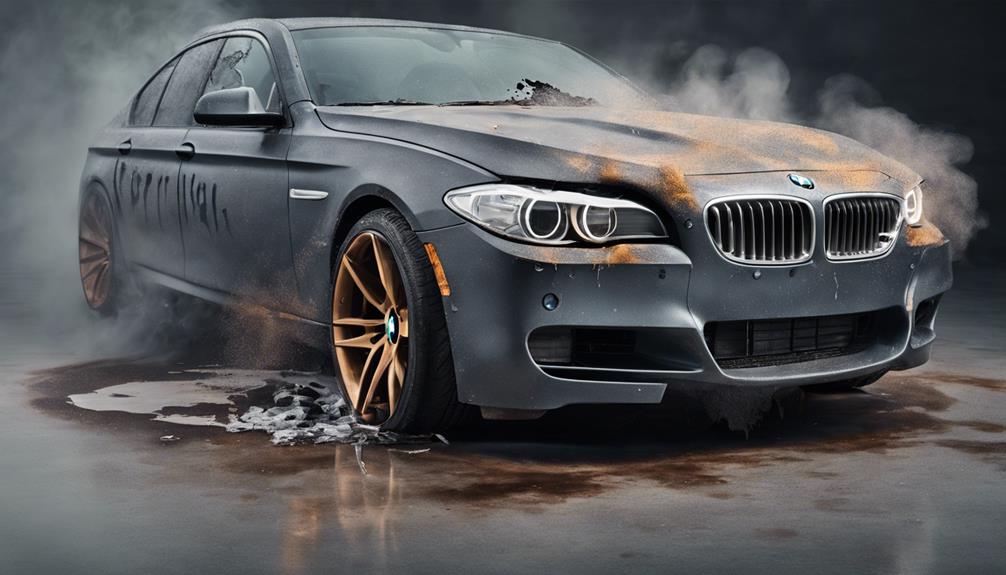
Concern yourself with the common failures of the BMW F01, where issues such as iDrive system crashes and transmission problems persist. When delving into the world of BMW F01 failures, brace yourself for a wild ride filled with glitches and malfunctions. Here's what you might encounter:
- iDrive System Crashes: Imagine this – you're cruising down the highway, enjoying your favorite tunes, when suddenly the iDrive system decides to take an unscheduled nap, leaving you stranded in a digital blackout.
- Blurry Front and Side Cameras: Envision relying on your cameras for a clear view of your surroundings, only to be greeted by a fuzzy mess that resembles a modern art piece rather than a functional aid.
- Parking Brake and Auto Brake Malfunctions: It's like having a mind of their own – one moment your brakes are your best friends, the next they're plotting against you, causing chaos and confusion in your driving experience.
In the domain of BMW F01 failures, be prepared for a rollercoaster of surprises that might leave you questioning the very essence of automotive technology.
Frequently Asked Questions
Is BMW F01 Reliable?
You might question the reliability of the BMW F01 due to known issues like iDrive malfunctions, parking brake troubles, and transmission glitches. Despite these concerns, proper maintenance and care can help mitigate potential problems.
Which Year 7 Series Is Most Reliable?
For the most dependable BMW 7 Series, consider the 2016 model. Packed with cutting-edge technology and engineering advancements, it delivers outstanding performance and durability. You'll enjoy a smooth ride without worrying about frequent repairs.
What Is the Difference Between BMW F01 and F02?
When comparing the BMW F01 and F02, you'll notice the F01's agility and handling due to its shorter wheelbase, while the F02 excels in rear legroom and interior space for a luxurious ride. Choose based on your driving or passenger comfort preferences.
What Is the Top Speed of the BMW F01?
You can expect the BMW F01 to hit top speeds varying between 155-190 mph, depending on the specific model like the 740i, 750i, or 760Li. The top speed is electronically limited for safety measures.






